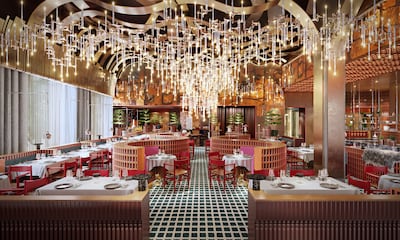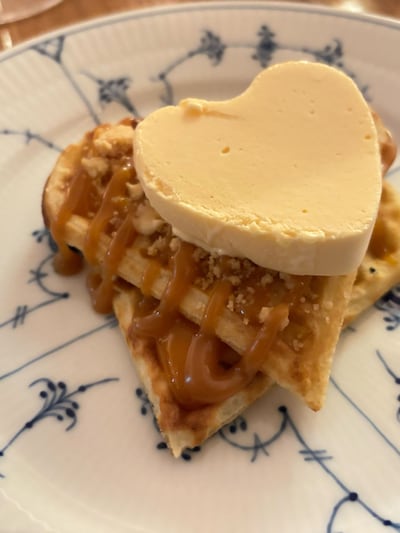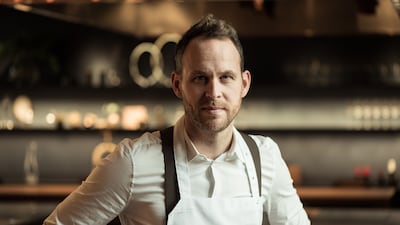In 2018, chef Bjorn Frantzen put Stockholm on the global culinary map when his restaurant, Frantzen, became the first from Sweden to achieve three stars, the highest accolade given by the Michelin Guide. Three years later, halfway across the world, another one of his restaurants snagged the same recognition: three Michelin stars for Zen in Singapore.
“What people don't understand sometimes is that when you win three stars for a restaurant, you then have to keep winning it every year,” says Frantzen, who was “kind of done with fine dining” after this double accolade.
“It's not like you can just franchise these restaurants out and keep opening new ones. They are very personal and they require a lot of hard work,” says the chef, who owns seven restaurants across Sweden, Singapore, Thailand, Spain and the UK. “It’s a work-life balance thing.”
chef and restaurateur
Despite noting that he was “happy with only two three-starred restaurants”, the footballer-turned-chef is in Dubai for the pre-opening prep of not one, but two ventures. Studio Frantzen is a casual version of the upscale venue similar to the one in London. FZN is a fine dining restaurant.
Both are located in Atlantis The Palm and will serve French-Asian cuisine with a Nordic touch when they open in November.
Land of opportunities
Frantzen says he couldn't resist the opportunity to join Dubai's bustling culinary scene. “I have had a number of offers to open a restaurant here,” he says, adding that he has seen “a massive development in the region over the past four to five years”, which prompted him to say finally say yes.

Frantzen is particularly excited about the “new generation of young chefs coming up, who bring with them regional cooking with local ingredients, and I want to be part of and maybe help develop, that”. Among his peers and in-the-know diners, Frantzen is famed for being a staunch champion of sourcing locally, and he's excited about how that might play out in a region such as the Middle East.
“Opening a restaurant is one thing, but where we will be in six months is another. We have to build relationships with guests, suppliers and other chefs – similar to how we did it when we first opened in Singapore.
“At that time, in 2021, we were more European-driven, especially Nordic and French influences. Now, six years later, we lean more towards Asia and Japan when it comes to ingredients and the way the menus evolve.”
Asked if he thinks Dubai's culinary scene is experiencing a bubble, especially after some fine dining establishments recently shut down after a short period in operation, Frantzen says: “I think this is happening everywhere. People have been wondering if Nordic gastronomy is a bubble, and they've been wondering that for the last 20 years. We're still fully booked in Stockholm.”
He adds: “Sometimes with restaurants, you just don't know why some work and some don't. It's just the way it is – same in New York, in Paris or in Tokyo. It's the same in all these big cities with a high tempo.”
Fusing French and Asian with Nordic influences
There's still some pressure, he admits, but more because of his reputation and the “weight that comes with having three-starred restaurants”. For Studio Frantzen and FZN, the chef does not plan to rock the boat too much.

“The way I cook is the way I cook. It has a French-Asian base and then, of course, me being Swedish, I also like spicing things up with a touch of the Nordic,” says Frantzen. FZN will serve a tasting menu, but Studio Frantzen is more laid back with an a la carte menu.
Fusing Asian and European techniques is a calculated choice for the chef, who loves the “lightness of Asian food”, but uses his French training to come up with balanced meals.
Details of the menus for both restaurants have not been revealed yet, but The National got a taste of what Frantzen will be offering at a pre-opening tasting. Sample dishes included hamachi sashimi with fermented strawberry, watermelon radish, salted plum and birch oil; a whole chicken with an extremely remarkable Kyoto miso beurre blanc and burnt hay oil; artichoke barigoule with green asparagus, crispy leek and pistachio; and, for dessert, cloudberry and butterscotch waffles with creme fraiche ice cream and tonka bean.

The Swedish chef admits Nordic cuisine does not necessarily have a rich history compared to, say, Indian or Italian cuisines. “It's one that's focused on survival,” he explains, but adds that chefs benefit a lot from local ingredient sources and intricate methods of fermentation or pickling, for example.
“We have this ingredient called vendace roe that, for me, is better than caviar. It's a special roe that comes from the northern parts of Sweden. We also have ingredients such as pine needles, which have a nice citrus flavour,” says Frantzen, explaining how he's going to incorporate all such Nordic touches to his French-Asian approach.
“I'm not going to cook meatballs,” he concludes with a chuckle. “That is not happening.”

